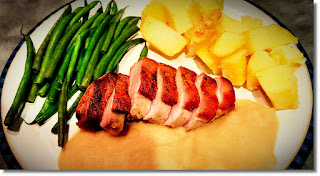In the area around Amiens in the Somme they take rhubarb very seriously and this recipe is based (pretty loosely) on a dish from there. The sauce has a sweet and sour quality that's sharp enough to cut through the rich flavour of duck but it will also work very well with pork, goose or guinea fowl.
If you're using sweet, forced rhubarb such as the superb product from the Rhubarb Triangle in Yorkshire, then it won't need much (if any) sweetening. If in doubt, use the minimum amount of grenadine and add any necessary sweetening at the end.
Despite my sincere attempts to be lazy, I'm now reluctantly forced to admit that the very best grenadine is homemade. Unless you're obsessed with cocktails, though, you probably don't have any, so use whatever commercial brand you fancy. If you don't have any grenadine at all, then just sweeten with honey, agave nectar or even plain sugar, but combine them with a little pomegranate molasses, if possible.
The sauce can be made in advance and reheated when the duck is ready to serve. The amounts here will make enough sauce for 4 portions and making less isn't as easy. If you have any sauce left over, then it will freeze very well. (Apologies for the shabby picture; I was having camera problems)
Duck breasts, 1 per portion (there's enough sauce for 4)
For the sauce:
1 shallot, finely chopped
1 garlic clove, crushed
1 fennel bulb, any tough bits removed and chopped into small chunks
3 large or 4 smaller sticks of rhubarb, cleaned and cut into small chunks
2 - 3 tsp grenadine (or an alternative sweetener, see above)
125ml chicken or veg stock (or water will do, if you're rushed)
To make the sauce, soften the shallot in a little oil over a moderate heat for 3 minutes or so. Add the garlic and chopped fennel and continue frying for another 3 minutes. Add the rhubarb and continue frying for yet another another 3 minutes. Season with salt and pepper.
Pour in the stock and the grenadine (use less grenadine for sweeter, forced rhubarb). Cover the pan loosely and simmer for 10 - 15 minutes until everything is softened.
Take the pan off the heat and blitz the contents to a smooth consistency (a stick blender is easiest). Adjust the seasoning and add more sweetener if it needs it. Keep the sauce warm while you cook the duck, or chill until needed and reheat before serving.
To cook the duck, preheat oven to 200°C. Score the duck breasts several times on the skin side and season with salt and pepper on both sides. Preheat a dry, ovenproof frying pan over a moderate heat. Add the duck breasts skin side down, keeping the heat quite high, and cook for 5 minutes without moving them. Pour off any excess fat, turn the breasts and fry for 1 minute. Turn back onto the skin side and place in the oven for around 5 minutes. The time in the oven will vary according to the thickness of the breast and just how rare you like duck, but 8 minutes is usually a maximum for even the thickest breasts. Remove the breasts and let them rest, skin side up, for 10 minutes or so before slicing and serving with the sauce.
This dish has plenty of flavour, so I'd recommend keeping the accompaniments simple - some green beans and potatoes would do quite nicely.




I find cooking duck breasts a bit tricky but your method sounds like I could manage it and the rhubarb sauce sounds delicious.
ReplyDeleteSadly our rhubarb plant in France gave up and died a few years ago. Where there is sufficient shade there is not enough moisture because of the trees. The plant we have in the UK is prolific though. I doubt there are many other people who bring rhubarb to France courtesy of Ryanair!
I've been using this way of cooking duck breast for 25 or 30 years now and I promise that it works for me. I think it was based on Paul Rankin's method originally and then reinforced by cooking in Normandy. One minor caveat is that it's possible to find some magret de canard in France that are so thick that you need to leave them in the oven just a tiny touch longer. By the way, the resting time is really important.
DeleteFrom talking to French gardeners, I know that as you go towards the south it can get trickier to grow rhubarb consistently. But the soil and climate in parts of the north of France are absolutely perfect and, given that the French are so passionate about regional produce, I don't know why they don't celebrate it more than they do.
Your duck with the fennel and rhubarb sauce sounds like a wonderful combination of flavors. Karen (Back Road Journal)
ReplyDelete